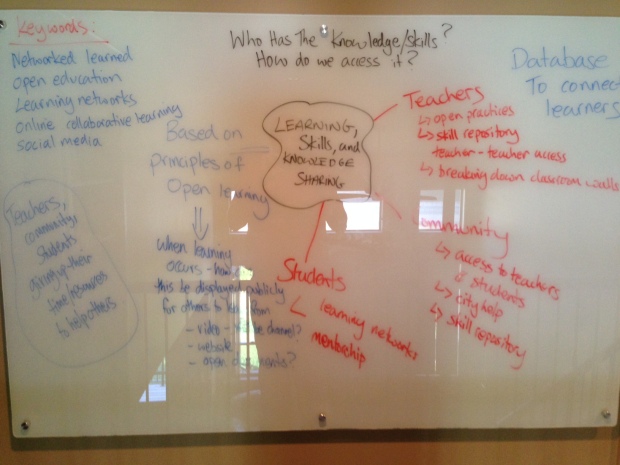The journey of narrowing down a topic for my lit reviews has not been easy. Fraught with indecision and a stubbornness to find the perfect topic, the delays have been frustrating. One on one chats with my professor forced me into thinking carefully about what I was looking for in a lit review and subsequent project, and here are some of my musings.
I started to think about what I was looking for in a project and came up with a short list:
- It may sound simplistically obvious, but I want my lit review to be personally relevant. I have to be jazzed about the idea.
- I also need the topic to be meaningful to my practice. I do not want to complete a lit review and project just for the sake of it. The information I read and process in the lit review has to, somehow, enhance my practice and help me become a better educator.
- Selfishly, it also has to be a topic that will help me create opportunities outside of the k-12 classroom. I cannot see myself working solely as a classroom teacher for the next 20 years.
Next, I started to consider some of the issues I see in education and use this as a driving force to change. Some of the challenges I see are as follows:
- The model of school – The more time I spend in education, the more I get excited about the learning aspect of school and the more disheartened I get about the miscellaneous aspects of school. I often feel that school gets in the way of learning.
- Another issue, I see in schools, is the culture. Rank and sort, grouping students by age, individual classrooms, grades, award systems, compartmentalized subjects, and inequity work against a model of learning and inquiry.
- I believe more and more students are starting to question the personal relevance of their school experience.
When thinking of lit review topics and possible masters projects four themes have started to emerge:
- Multi-access Learning – Learning does not always occur between the bookends of a typical school day. There is an opportunity to develop more freedom for students of all ages to access learning at a time that is personally convenient. Flexible attendance may take the pressure of certain students and allow for more focused instructional time, and opportunities for asynchronous delivery may reduce anxiety for others. One major disadvantage of choosing multi-access learning as a topic is making it meaningful to my practice. I don’t think this is a model for elementary school students that we see anytime soon.
- Game-based/Simulation-based Learning – According to NMC Horizon Report: 2011 K-12 Edition, “Game-based learning has grown in recent years as research continues to demonstrate its effectiveness for learning. Games for education span the range from single-player or small-group card and board games all the way to massively multiplayer online games and alternate reality games.” (Johnson, Adams, & Haywood, 2011) I am hesitant of choosing game-based learning as a lit review topic because of the stigma associated with the use of games in education. Even though I see the value of game-based learning in education the term ‘edutainment’ comes to mind. I can foresee some of the emails I might receive from parents condemning more of their children’s time allotted to gaming. I am also slightly conflicted about the reward aspect of gaming. As an educator, I am very conscious about the destructive nature of reward-based systems as a method of obtaining results.
- Open Education – Open education and open practices cover a broad range of subtopics. The idea, that intellectual property can be shared for the benefit of everyone, is an exciting prospect. I believe that education can and should be available to anyone at anytime, and there exists opportunities to reduce costs in education by using open educational resources. One of the greatest challenges I see in pursuing Open Education masters project are the overly restrictive privacy laws in British Columbia.
- Inquiry/Personalized Learning – This is the topic I am most excited about right now. Last year I introduced a block of time set aside each week called C.H.O.I.C.E. Children Have Ownership In Choice Education (C.H.O.I.C.E) was modeled on #geniushour, Passion Time, and 20% time. Essentially, it allows time in our weekly schedule for students to direct their own learning, explore areas of personal interest, develop a sense of inquiry, and have an outlet for their own brand of creativity. It did not go so well when I introduced because I gave my learners too much freedom and did not adequately scaffold the inquiry process. I believe I can learn from my mistakes and help others avoid some of the schoolboy errors I initially made when I introduced it.
I also need to consider an overarching learning theory to support my project. Inquiry learning and the learning theory of Constructivism compliment each other. “Constructivism states that learning is an active contextualize process of constructing knowledge rather than acquiring it.” (“Constructivism,” n.d.)
References:
Constructivism. (n.d.). In Learning-Theories. Retrieved January 17, 2015, from
http://www.learning-theories.com/constructivism.html
Johnson, L., Adams, S., & Haywood, K. (2011). Horizon Report > 2011 K – 12 Edition. Methodology (p. 36). Retrieved from http://www.nmc.org/pdf/2011-Horizon-Report-K12.pdf
